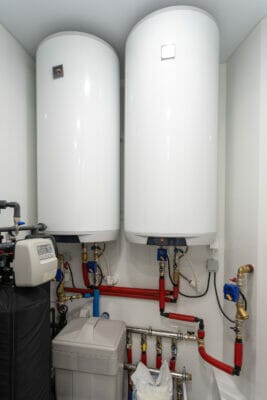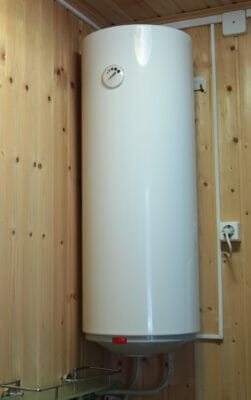Disclaimer: This post may contain affiliate links, meaning we get a small commission if you make a purchase through our links, at no cost to you. For more information, please visit our Disclaimer Page.
MBH water heater input is the maximum amount of energy your water will consume per hour.

Table of Contents
Is MBH The Same As BTU?
MBH and BTU are the same in that they are both measurements of energy. BTU stands for British Thermal Unit, while MBH is equal to a thousand BTU per hour. BTU is a unit to measure work, equivalent to approximately 1055 Joules.
One BTU is equal to the measure of energy used to raise the temperature of one pound of water by one degree Fahrenheit.
What Is The Difference Between MBH and CFH?
CFH is the measure of natural gas that can heat water in a gas water heater per hour. One cubic foot per hour is equivalent to 1000 BTUs.
This means that 1 CFH is equal to 1MBH. There is, therefore, no difference between MBH and CFH in the measure of temperature conversion.
Do MBH, BTU, And CFH Input Matter In My Water Heater?
MBH and BTU matter in your water heater for rating purposes. Most buyers, however, are usually confused about these ratings and how to tell which one is the best to use.
When purchasing a water heater, this is one of the aspects that people consider.
As stated earlier, the MBH and BTU inputs measure the amount of energy your heater will use to raise your water temperature. These input ratings are essential to determine your water heater’s efficiency. You can calculate the efficiency by dividing the output by the input.
For example, if your water heater’s input is 150 MBH and the output is 135 MBH, the efficiency will be (135/150)x100, equal to 90, hence 90% efficiency.
It is crucial to get a water heater with sufficient MBH; otherwise, you will be using excessive electricity, affecting your bills in the long run.
The amount of MBH varies from one water heater to another. Residential conventional tank water heaters use 40 MBH and can also be used in small commercial set-ups.
The tanks hold 30 to 40 gallons of water when full. Therefore, the MBH ratings must be higher to match their size, 30 to 40 MBH.
Water heater ratings are also determined by the number of gallons of hot water they can produce after the storage tank has been drawn down within a one-hour time frame.
In gas tank water heaters, the larger the burner, the higher the recovery rate.
Similarly, the larger the storage tank, the higher the recovery rate too.
Commercial tank water heaters are bigger than their residential counterparts. Their ratings are usually between 200 to 500 MBH and have storage tanks of more than 100 gallons of water. Their input supports high volume usage, for example, in medium to large industrial buildings.
Water Heaters And Efficiency Rating
As seen above, you can calculate your water heater’s efficiency as long as you know the MBH input and output figures.
Some water heaters have stickers that will give you their energy guide. The energy guide shows the water heater’s rating on a scale. Low ratings on the scale mean that your appliance will have low energy efficiency, while a high rating indicates high-energy efficiency.
Your water heater’s age will impact its efficiency. A conventional tank water heater of more than ten years old will be less efficient, even if its efficiency rating was high upon purchase. The more the years go by, the more the efficiency will decline.
After 10 to 15 years, which is the average life expectancy of a conventional water heater, you will be required to replace it. Otherwise, you will drive up your costs using much more energy than you initially would have.
Even if your water heater is not that old, other factors may affect its efficiency. One such factor is sediment build-up. Sediment build-up is the collection of minerals and impurities that settle on your water heater after hard water evaporates. This sediment settles at the bottom of your water tank and increases over time.
If you do not flush your water heater tank, the sediment will harden. When it hardens and sticks to your tank’s surface, it will weaken your tank and reduce your water heater’s efficiency.
The same problem also applies to corrosion in your water heater’s tank and its pipes. A combination of sediment, scale, and rust will act as thermal insulators in your water heater.
They form a wall between the water and heating elements. As a result, your water heater will take more time to heat the water, using up more energy in the process.
Efficiency is not limited to your water heater’s structure or property, but its usage as well. Your water heater usage has to match your household needs. You can operate a 30-gallon water heater for a family of eight people or a commercial business such as a restaurant.
You will have to upgrade it as it will not function even as half as efficiently as it is supposed to.
Are Gas Heaters More Energy Efficient Than Electric Water Heaters?
There is an assumption that gas water heaters are more energy-efficient than electric water heaters. Gas water heaters do cost less than electrical water heaters because natural gas is cheaper than electricity.
Despite the difference in cost, electric water heaters are more efficient. A gas water heater will use more energy to function.
Moreover, it releases waste into the environment, whose by-product takes some heat with it. This makes it less efficient than electric heaters.
On the contrary, an electric water heater uses most, if not all, of its energy to heat the water, making it more efficient. Energy efficiency comes in, in that while gas water heaters release heat along with its by-products, electric water heaters retain it to continue heating or keep the water warm.
Some gas water heaters have adopted high-energy efficiency, and they surpass electric water heaters in this regard. These gas water heaters have an Energy Star label on them.

Do Water Heaters Have An Environmental Impact?
In this day and age, people are concentrating on conserving the environment the best way they can. It is valid and responsible to question your water heater choice as safe for the environment.
Electric water heaters are more eco-friendly than gas water heaters. They are energy efficient and do not release any by-products into the atmosphere. You can also power electric heaters with alternative renewable energy sources such as hydroelectric and solar power.
Gas water heaters are less eco-friendly as they release by-products after heating water, and they may be harmful to the environment. Another environmental concern is the origin of the gas used to power the gas water heaters.
The natural gases are extracted from Earth is a damaging and highly wasteful process.
Do Water Heaters Have Safety Concerns?
The biggest safety concern lies with gas water heaters. If you have a gas line at home, you are at risk of gas leaks, which may lead to fires, or worse, explosions.
Carbon monoxide leaks might also occur, so checking the vents and pipes is mandatory to ensure none of these elements leak.
Electric water heaters pose less of a threat, but they require dedicated circuits to avoid breaker trips.
